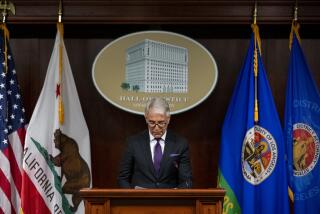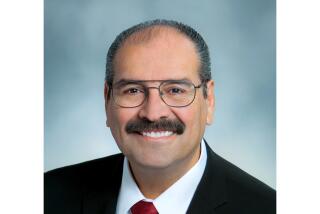Gonzales and the ‘hive mind’
- Share via
ATTY. GEN. Alberto R. Gonzales dealt our assembled senators a mighty dose of frustration this week, parrying their wickedest thrusts by claiming, for example, that key decisions about which U.S. attorneys to fire emerged from “a process that was ongoing that I did not have transparency into.” The senators did not respond well. Even Republicans seemed to suspect a certain lack of candor.
If Gonzales really had been the one to decide which of his top employees to fire, then he was lying. On the other hand, if he truly hadn’t even seen the list of names of those to be dismissed until it was complete, then he was working inside a cloud of obliviousness that would get a person fired from the local Mailbox Central.
But there’s a third way to look at it, revealed in the way the attorney general combined the usual passive-voice bureaucratese with terms — “recommended list,” “information-sharing project” and “consensus recommendation” — that hint at the language of collaborative filtering. Gonzales may be on the cutting edge of a knowledge revolution that is reinventing the way we work, study and play. Old notions of transparency and responsibility are not exactly obsolete in this new world; rather, they are special cases, rare islands of individual understanding in a society increasingly governed by the wisdom of crowds.
For example, Amazon frequently recommends books that “it” thinks you should buy. Who makes these recommendations? Nobody does — or rather, everybody does. Amazon watches your purchases and the ratings you give to things you like, and it runs a complex program that identifies common patterns among millions of users. The result is a list of recommended books, without any recommender.
Now, imagine the books are U.S. attorneys. You needn’t object that there wasn’t a computer observing Gonzales, or Karl Rove, or President Bush himself, as each praised or criticized an attorney. No computer is required. The number of transactions in the tiny and insular world of the Bush administration is minuscule in comparison to the number of purchases that Amazon tracks. Put into a database, with a field for every time somebody important makes a telling remark, the total amount of data to crunch would fit on a thumb drive. Hey, it could even fit in a person’s brain.
Gonzales said in his testimony that he had nothing to do with making the list, but when he saw it, he wasn’t surprised. And it’s not surprising he wasn’t surprised. The list reflected the “hive mind”; it was opinion writ large, in the same way we all know that Sanjaya deserved to be kicked off “American Idol.”
The key to making a consensus operative — getting it out of mere chatter and into the real world — is preventing the outbreak of factionalism and debate, which can lead to time-wasting attempts to resolve conflicts by “thinking” about them. The Bush administration, so brutal when seen from the outside, has been a remarkable oasis of cooperation within. Now well into the last quarter of its eight-year tenure, the executive branch has weathered a series of national crises that border on catastrophe, and yet it has yielded no point of principle or policy. Though plans may have occasionally been foiled by force majeure (the unforeseeable sectarian violence in Iraq, for instance, or the surprising vulnerability of Gulf Coast cities to wind and water), still, in nearly every case, White House staffers have stuck to their stories and to each other. There have been few public fights and bitter resignations, fewer negotiations with adversaries, no apologies and certainly no explanations.
Almost exactly three years ago, then-National Security Advisor Condoleezza Rice appeared before Congress to talk about why she hadn’t felt it necessary to take any special action after being warned that Osama bin Laden was determined to strike in the United States. “If there was any reason to believe that I needed to do something,” Rice said at the time, “I would have been expected to be asked to do it.” At the time, this sentence seemed a marvel of tortured syntax and evasive passivity. But with Gonzales’ testimony in hand, we can now read it differently. What Rice was saying was not that she was too disengaged or too inexperienced to do her job. Instead, she may merely have been expressing her trust in the distributed system of knowledge that gives the Bush administration its remarkable confidence.
The hive mind has a curious blindness, however. It has reasons for doing things, but those reasons are typically inaccessible to its members. Pressed hard, Gonzales simply looked at the committee and admitted that he was baffled as to why he did what he did. Repeatedly, he was asked what criteria were used to select individuals for firing. “I would like to know,” he said. “I would like to ask that question.”
More to Read
Get the L.A. Times Politics newsletter
Deeply reported insights into legislation, politics and policy from Sacramento, Washington and beyond. In your inbox twice per week.
You may occasionally receive promotional content from the Los Angeles Times.









